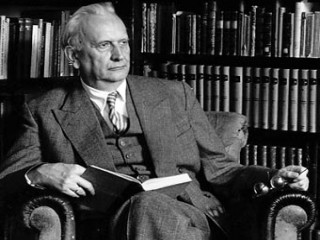
Karl Jaspers biography
Date of birth : 1883-02-23
Date of death : 1969-02-26
Birthplace : Oldenburg, Germany
Nationality : German
Category : Science and Technology
Last modified : 2011-10-07
Credited as : philosopher, psychopathology,
The German philosopher Karl Jaspers wrote important works on psychopathology, systematic philosophy, and historical interpretation.
Karl Jaspers was born in Oldenburg, close to the North Sea coast, on Feb. 23, 1883. His father was a prosperous bank director. After graduation from the gymnasium in Oldenburg, Jaspers studied at Heidelberg, Munich, Berlin, and Gottingen.
Though he lived to be 86, Jaspers's health was always fragile. From early childhood he suffered from bronchiectasis with cardiac decompensation. This required him to organize his limited energies with great care. Yet he accomplished much teaching and writing under these limitations and was helped greatly, particularly in his writing, by his wife, Gertrud Mayer, whom he married in 1910.
In 1909 Jaspers received the degree of doctor of medicine and began to specialize in psychiatry. For 7 years thereafter he worked in the psychiatric clinic attached to the university hospital in Heidelberg. It was here that Jaspers began to work out a classification of basic personality types. This work, influenced further by discussions with his friend Max Weber and by the latter's theory of ideal types, culminated in Jaspers's first major work, General Psychopathology (1913). With this work Jaspers acquired a position on the psychology faculty at Heidelberg.
In this first major work Jaspers discovered one of the essential themes of his thought: "Man is always more than what he knows, or can know, about himself." From Immanuel Kant, Jaspers learned that man, the source of all objective inquiries, cannot himself be known—in his entirety—through objective inquiry. All scientific views on man are limited and partial. But, following SÃren Kierkegaard, Jaspers began to develop a way of describing what lies behind these objective inquiries—the unique individual, or, as he called it, Existenz.
In his next major work, The Psychology of World Conceptions (1919), Jaspers explored the range of fundamental world views, in relation to which individual men find their own identity. He also began to explore those "boundary situations" in life that force individuals to face up to the
meaning of their unique existence. These include the awareness of one's sexuality; suffering and conflict; shame, betrayal, and guilt; and the death of loved ones and the awareness of one's own death. In this way Jaspers brought to the fore that concentration on the individual self and its experiences that has come to be the distinguishing mark of existentialism. In 1921 he was given a chair in philosophy at Heidelberg.
Jaspers himself always placed alongside the emphasis on subjectivity an equal emphasis on shared reason in all its forms, particularly in the sciences. The philosophical task is first to come to grips with the basic modes of objectifying reason, then to understand the forms and methods by which the objectifications are made, and finally to relate these forms to the human subjectivity from which they arise. Philosophical thought then rises to the "encompassing," the ultimate reality that contains both the objects and the acts of thinking within itself.
In the works of his maturity, Philosophy (3 vols., 1932), Philosophical Logic (1947), and Philosophical Faith (1948), Jaspers develops a view of philosophy as a never-ending search for this total vision. No such vision is or can be complete and final. Supporting the limited attempts is a philosophical faith in truth and communication which preserves the thinker from dogmatism and intolerance of other attempts. Jaspers's philosophical faith also maintains that man, finding himself dependent and inadequate, is open to a transcendence that grounds and supports his existence and maintains his freedom.
These opinions were put to a severe test after the Nazis came to power. Always critical of Nazism, Jaspers was forced to retire in 1937 and forbidden to publish in 1938. His wife, who was Jewish, was under constant threat, and the couple had already been scheduled for deportation to a death camp when the U.S. army entered Heidelberg in April 1945.
Jaspers took a chair of philosophy at Basel in 1949 and spent the next 2 decades writing on such topical questions as German guilt, demythologizing the Gospels, and the atom bomb, in addition to large-scale historical works. He died after a stroke on Feb. 26, 1969, in Basel.
The fundamental book for approaching Jaspers is The Philosophy of Karl Jaspers, edited by Paul Arthur Schilpp (1957). It contains a lengthy "Philosophical Autobiography" by Jaspers and two dozen important descriptive and critical essays on his philosophy, together with his replies and a bibliography complete to early 1957. Charles F. Wallraff, Karl Jaspers: An Introduction to His Philosophy (1970), is useful.


















